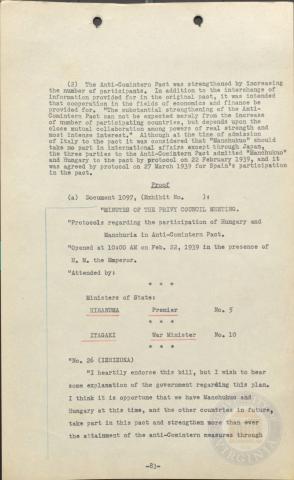
Page 83
| Parent | Collaboration Between Japan, Germany and Italy - Volume II |
|---|---|
| Date | 25 November 1941 |
| Language | English |
| Collection | Tavenner Papers & IMTFE Official Records |
| Box | Box 15 |
| Folder | Japan, Germany, Italy Collaboration Vol 2 |
| Repository | University of Virginia Law Library |
(2) The Anti-Comintern Pact was strengthened by increasing the number of participants. In addition to the interchange of information provided for in the original pact, it was intended that cooperation in the fields of economics and finance be provided for. "The substantial strengthening of the Anti- Comintern Pact can not be expected merely from the increase of number of participating countries, but depends upon the close mutual collaboration among powers of real strength and most intense interest." Although at the time of admission of Italy to the pact it was considered that "Manchukuo" should take no part in international affairs except through Japan, the three parties to the Anti-Comifctern Pact admitted "Manchukuo" and Hungary to the pact by protocol on 22 February 1939, and it was agreed by protocol on 27 March 1939 for Spain1 s participation in the pact.
Proof
(a) Document 1097, (Exhibit No. ):
"MINUTES OF THE PRIVY COUNCIL MEETING.
"Protocols regarding the participation of Hungary and Manchuria in Anti-Comintern Pact.
"Opened at 10:00 AM on Feb. 22, 1939 in the presence of H. M. the finperor.
"Attended by:
* * *
Ministers of State: HIRANUMAPremierNo. 5
♦ * *
ITAGAKIWar Minister No. 10
» * *
"No. 26 (IZHIZUKA)
"I heartily endorse this bill, but I wish to hear some explanation of the government regarding this plan. I think it is opportune that we have Manchukuo and Hungary at this time, and the other countries in futuref take part in this pact and strengthen more than ever the attainment of the anti-Comintern measures through
